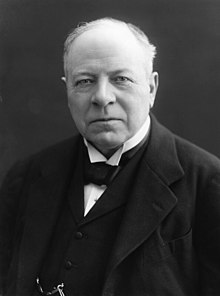
Back ريتشارد هالدين Arabic ريتشارد هالدان ARZ Richard Burdon Haldane Czech Richard Haldane, 1. Viscount Haldane German Richard Haldane (1er vicomte Haldane) French Richard Haldane Hungarian Richard Burdon Haldane Italian 제1대 홀데인 자작 리처드 홀데인 Korean Richard Haldane Polish Richard Haldane Portuguese
The Viscount Haldane | |
|---|---|
 | |
| Lord High Chancellor of Great Britain | |
| In office 10 June 1912 – 25 May 1915 | |
| Monarch | George V |
| Prime Minister | H. H. Asquith |
| Preceded by | The Earl Loreburn |
| Succeeded by | The Lord Buckmaster |
| In office 22 January 1924 – 6 November 1924 | |
| Monarch | George V |
| Prime Minister | Ramsay MacDonald |
| Preceded by | The Viscount Cave |
| Succeeded by | The Viscount Cave |
| Leader of the House of Lords | |
| In office 22 January 1924 – 3 November 1924 | |
| Prime Minister | Ramsay MacDonald |
| Preceded by | The Marquess Curzon of Kedleston |
| Succeeded by | The Marquess Curzon of Kedleston |
| Secretary of State for War | |
| In office 10 December 1905 – 12 June 1912 | |
| Prime Minister | Sir Henry Campbell-Bannerman H. H. Asquith |
| Preceded by | H. O. Arnold-Forster |
| Succeeded by | Colonel J.E.B. Seely |
| Member of the House of Lords | |
| Hereditary peerage 27 March 1911 – 19 August 1928 | |
| Member of Parliament for Haddingtonshire | |
| In office 18 December 1885 – 27 March 1911 | |
| Preceded by | Hugo Charteris |
| Succeeded by | John Hope |
| Personal details | |
| Born | 30 July 1856 Edinburgh, Scotland |
| Died | 19 August 1928 (aged 72) Auchterarder, Scotland |
| Nationality | British |
| Political party | Liberal (1879–1923) Labour (1923–1928) |
| Education | University of Göttingen University of Edinburgh |
| Profession | Barrister |


Richard Burdon Haldane, 1st Viscount Haldane, KT, OM, PC, FRS, FSA, FBA (/ˈhɔːldeɪn/; 30 July 1856 – 19 August 1928) was a British lawyer and philosopher and an influential Liberal and later Labour politician. He was Secretary of State for War between 1905 and 1912 during which time the "Haldane Reforms" of the British Army were implemented. As an intellectual he was fascinated with German thought. That led to his role in seeking detente with Germany in 1912 in the Haldane Mission. The mission was a failure and tensions with Berlin forced London to work more closely with Paris.
Raised to the peerage as Viscount Haldane in 1911, he was Lord Chancellor between 1912 and 1915, when he was forced to resign because of allegations of German sympathies. He later joined the Labour Party and once again served as Lord Chancellor in 1924 in the first Labour administration. Apart from his legal and political careers, Haldane was also an influential writer on philosophy, in recognition of which he was elected a Fellow of the British Academy in 1914.[1]